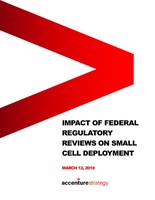Modernizing FCC Siting Rules Would Jumpstart 5G Investment & Deployment
New Accenture analysis commissioned by CTIA shows potential savings of $1.6 billion over 9 years from modernizing reviews of small cells
WASHINGTON, March 13, 2018 /PRNewswire-USNewswire/ -- CTIA released the results of a new Accenture (NYSE: ACN) analysis today that shows modernizing federal reviews of new wireless infrastructure - like the reforms currently proposed by the Federal Communications Commission (FCC) - could significantly lower the cost to deploy 5G networks by $1.6 billion over 9 years.


The FCC is due to vote on exempting small cell installations from certain federal reviews on March 22. The CTIA-commissioned analysis by Accenture Strategy found that when such reviews are required, almost a third of the cost of next-generation wireless deployments go to federal regulatory reviews that the FCC now proposes to eliminate as unnecessary. These reviews cost industry $36 million in 2017, and are expected to increase over six-fold in 2018.
"These findings validate Commissioner Carr's call to action and the FCC's proposal to modernize outdated federal rules that have not kept pace with new technology. To win the global race to 5G, we need to accelerate small cell installations and reduce the costs of deployment," said Meredith Attwell Baker, CTIA President and CEO. "The FCC's common sense proposal will cut the cost of rolling out tomorrow's wireless networks by over a billion dollars and speed their availability to communities across America."
To keep up with increasing demand for wireless data and build out 5G networks, the wireless industry needs to deploy hundreds of thousands of modern wireless antennas - small cells - in the next few years. Small cell deployments will escalate rapidly from roughly 13,000 deployed in 2017 to over 800,000 cumulatively deployed by 2026, according to the analysis.
Small cells are similar in size to a pizza box and can be deployed on streetlights or utility poles in about one hour. However, under rules that were designed decades ago for 200-foot cell towers, getting necessary federal and local permissions can take over a year and require multiple, duplicative reviews including federal environmental and historic preservation reviews.
The FCC's new rules would modernize the historic and environmental regulatory requirements for wireless deployments, exclude small cells from certain federal regulatory hurdles, and adopt a "shot clock" for FCC review of environmental assessments when required. The analysis found that the U.S. will see a 550% increase in small cells year over year in 2018, underscoring the need for FCC action now to jumpstart more broadband investment.
Wireless carriers are conducting 5G tests across the U.S. and planning early availability for consumers by the end of this year. 5G will be up to 100 times faster than current 4G networks and be able to handle 100 times the number of connected devices, enabling IoT and smart cities.
Prior research by Accenture Strategy from 2017 estimated that the U.S. wireless industry will invest as much as $275 billion nationwide to deploy 5G, providing a $500 billion boost to the economy and creating three million new jobs.
CTIA has produced a new video to show how quickly and unobtrusively a small cell can be installed on a suburban street if the FCC updates its rules.
About the Research
This research was commissioned by CTIA. Accenture gathered input from a survey of carriers representing the wireless industry on spend related to federally-mandated historic and environmental reviews and other key data points to understand, estimate and project future spend. This input, together with publicly available research sources and Accenture analysis, was used to extrapolate future impact out to 2026.
About CTIA
CTIA® (www.ctia.org) represents the U.S. wireless communications industry and the companies throughout the mobile ecosystem that enable Americans to lead a 21st century connected life. The association's members include wireless carriers, device manufacturers, suppliers as well as apps and content companies. CTIA vigorously advocates at all levels of government for policies that foster continued wireless innovation and investment. The association also coordinates the industry's voluntary best practices, hosts educational events that promote the wireless industry and co-produces the industry's leading wireless tradeshow. CTIA was founded in 1984 and is based in Washington, D.C.
SOURCE CTIA
Related Links
WANT YOUR COMPANY'S NEWS FEATURED ON PRNEWSWIRE.COM?
Newsrooms &
Influencers
Digital Media
Outlets
Journalists
Opted In




Share this article